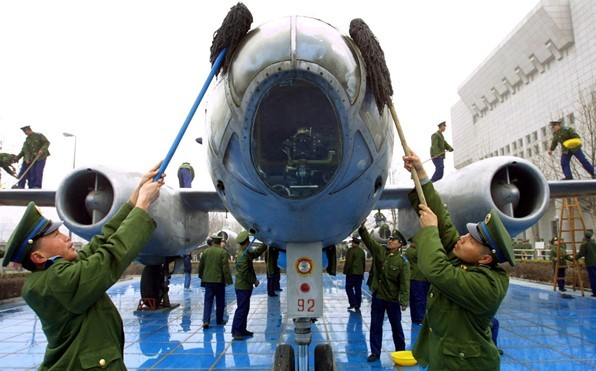The white paper titled "China's Military Strategy" issued by the State Council Information Office stressed the unification of strategic defense and operational and tactical offense, adding that China "will not attack unless we are attacked, but we will surely counterattack if attacked."
The nearly 9,000-word paper also retained the principal doctrine of the Chinese military to win local wars under conditions of "informationization." Under this doctrine, network-centric warfare and the growing informatization of the battlefield are seen as critical for the PLA's "preparation for military struggle."
"The world revolution in military affairs is proceeding to a new stage. Long-range, precise, smart, stealthy and unmanned weapons and equipment are becoming increasingly sophisticated. Outer space and cyber space have become new commanding heights in strategic competition among all parties," the paper noted.
"The adjustment is necessary as long-range, precise, smart, stealthy and unmanned weapons and equipment are becoming increasingly sophisticated, and outer space and cyberspace have become new command posts," said Yan Wenhu, a researcher with the Academy of Military Science (AMS) of the Chinese People's Liberation Army (PLA).
The paper also underscored that China will never enter into a nuclear arms race and pledges to lend more international peacekeeping and humanitarian assistance, as well as continue to contribute to world peace.
While it is the ninth defense white paper issued by China since 1998, it is the first to focus solely on strategy, rather than on the broader facts and figures of the country's military.
It focuses on the core and most sensitive questions concerning China's military and security policy, said Wen Bing, a researcher at AMS.
The paper also cited China's growing interests overseas mean that security of its assets and personnel abroad are becoming increasingly important, as were "strategic sea lines of communication."
Consequently, the paper said that China's navy would "gradually shift its focus from 'offshore waters defense'" alone, to combining this with "open seas protection." Saying that China seeks to develop itself into a "maritime power," it added that "the traditional mentality that land outweighs sea must be abandoned, and great importance has to be attached to managing the seas and oceans and protecting maritime rights and interests."
The report also emphasized that China is one of the major victims of cyberattacks, and will be developing a "cyber force" to ensure national network and information security, and maintain national security and social stability.
The white paper also warned of "anti-China forces"--a term that observers associate with the U.S. and its allies--"have never given up their attempt to instigate a 'color revolution' in this country," which it said had added to China's "challenges in terms of national security and social stability."
The paper is seen by analysts as being in line with the assertive mood fostered by President Xi Jinping. The paper noted Xi's slogan, "The Chinese Dream . . . of achieving the great rejuvenation of the Chinese nation," and said that the armed forces are seeking to become stronger in order to make this dream a reality.
"Without a strong military, a country can be neither safe nor strong," the paper said.
It also stressed that the PLA, which has recently seen several of its top leaders put under investigation for corruption and disciplinary violations, would emphasize the Party's "absolute leadership over the military," in a reminder of Xi's campaign to consolidate his control over the nation's armed forces.




























